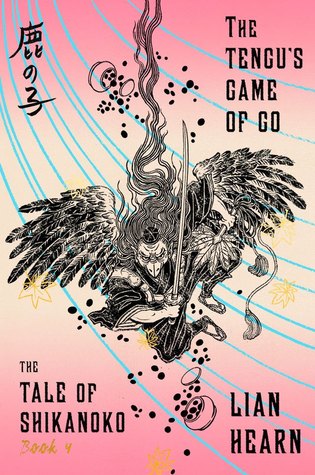 The Tengu's Game of Go (Tale of the Shikanoko, #4) by Lian Hearn
The Tengu's Game of Go (Tale of the Shikanoko, #4) by Lian Hearn Formats available: paperback, ebook, audiobook
Series: Tale of Shikanoko #4
Pages: 256
Published by FSG Originals on September 27th 2016
Purchasing Info: Author's Website, Publisher's Website, Amazon, Barnes & Noble, Kobo, Bookshop.org
Goodreads
An epic four-volume adventure in mythical medieval Japan: a world of warriors and assassins, demons and spirits
In The Tengu’s Game of Go, the final book of Lian Hearn's epic Tale of Shikanoko--all of which will be published in 2016--the rightful emperor is lost; illness and murder give rise to suspicions and make enemies of allies. Unrest rules the country. Only Shika can end the madness by returning the Lotus Throne to its rightful ruler.
As destiny weaves its rich tapestry, a compelling drama plays out against a background of wild forests, elegant castles, hidden temples, and savage battlefields. This is the medieval Japan of Lian Hearn's imagination, where animal spirits clash with warriors and children navigate a landscape as serene as it is deadly.
The Tale of Shikanoko, Book 1: Emperor of the Eight Islands (April 2016)The Tale of Shikanoko, Book 2: Autumn Princess, Dragon Child (June 2016)The Tale of Shikanoko, Book 3: Lord of the Darkwood (August 2016)The Tale of Shikanoko, Book 4: The Tengu's Game of Go (September 2016)
My Review:
In a way, I’m sorry that this series had to end. The story is utterly marvelous, and the world it creates is fascinating, deadly and beautiful, often all at the same time. But all good things must come to an end, and I’m very glad to see how it all turned out.
In my mind, there are multiple interpretations of this story. One is about the lengths that fate will go through to bring about what is meant to be after it is knocked out of its intended path by chaos. Another is about paying back and paying forward; one tengu upsets the balance, and another moves the heavens to restore the balance. And then there’s a third possibility; that our mortal lives are merely counters on a vast game of Go played by higher, or at least more powerful, beings. In other words, that we are all nothing more than pawns on something else’s chessboard.
None of these are comfortable thoughts, but they certainly make for an enthralling story.
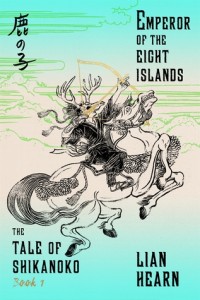 At the beginning, all the way back in Emperor of the Eight Islands, Shikanoko’s father loses a game of Go to a tengu, and forfeits his life. It’s not what should have happened, but because it did, Shika is exiled and supplanted as his father’s heir, and his father’s enemies stage a coup and overthrow the rightful emperor. After that all seems to descend into chaos. While the new, rightful child emperor is lost, the kingdom founders as heaven withdraws its blessings. The natural order has been overturned, and with it the seasons and finally the kingdom.
At the beginning, all the way back in Emperor of the Eight Islands, Shikanoko’s father loses a game of Go to a tengu, and forfeits his life. It’s not what should have happened, but because it did, Shika is exiled and supplanted as his father’s heir, and his father’s enemies stage a coup and overthrow the rightful emperor. After that all seems to descend into chaos. While the new, rightful child emperor is lost, the kingdom founders as heaven withdraws its blessings. The natural order has been overturned, and with it the seasons and finally the kingdom.
But the years pass. Shika becomes a man and in some ways, a sorcerer. The child emperor grows up and becomes a monkey-boy acrobat. And the kingdom descends further into despair, as the land rots and the crops fail.
In The Tengu’s Game of Go, that long ago game is set right. The tengu cheated, and won unfairly. So another tengu sets himself to thwart his rival, moving his chess pieces to bring Shika out of exile, to provide the hidden emperor with powerful allies, and to force fate back into its intended course.
But the emperor would rather be a monkey-boy.
Escape Rating A: If you have not yet read The Tale of Shikanoko, I envy you the journey. Especially since you will have the opportunity to read it all in one fell swoop, and not have to wait for each volume to appear from the mists of time and myth.
Although The Tale of Shikanoko seems to be classified as either fantasy or historical fantasy, I’m not quite sure that’s right. While there is magic and mysterious beings, it feels more like a myth. As though this is a story that never quite was, to illustrate problems that reflect in reality. So it is a story about time, fate, chance and the balance between order and chaos. The characters in the story represent forces as much as they do individual character arcs. Which does not for one moment lessen the reader’s happiness at seeing them triumph and find their rightful endings, whether good or evil.
I do wish that this had been published as a single volume. These don’t feel like separate stories at all, more like chapters in a single book. Also, this is a very densely packed story, there are a lot of moving parts, a lot happens, and there is a large cast. It took me a couple of chapters each time to get back into this world. It is definitely worth the effort, but I would have preferred the longer, deeper dive.
 The end of The Tengu’s Game of Go teases at a link between Shikanoko and the author’s first book, Across the Nightingale Floor. It has me looking forward to another marvelous journey in this mythic world.
The end of The Tengu’s Game of Go teases at a link between Shikanoko and the author’s first book, Across the Nightingale Floor. It has me looking forward to another marvelous journey in this mythic world.

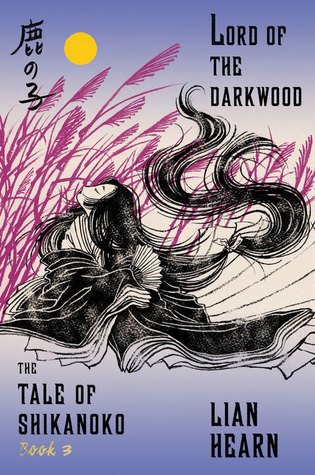 Lord of the Darkwood (Tale of Shikanoko, #3) by
Lord of the Darkwood (Tale of Shikanoko, #3) by 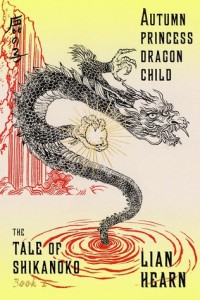 In some ways, there could be said to be three lords of this darkwood. One is Shikanoko – it is his by right of inheritance. Also, as the deer’s child, it is truly his world. He retreats into it to escape from his grief and his despair at the death of the woman he both loved and lost, the Autumn Princess. That story is told in the second book,
In some ways, there could be said to be three lords of this darkwood. One is Shikanoko – it is his by right of inheritance. Also, as the deer’s child, it is truly his world. He retreats into it to escape from his grief and his despair at the death of the woman he both loved and lost, the Autumn Princess. That story is told in the second book, 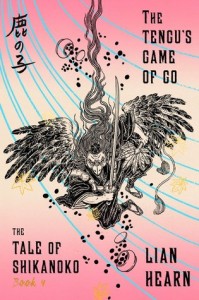 I don’t think it’s a coincidence at all that the final book is titled
I don’t think it’s a coincidence at all that the final book is titled 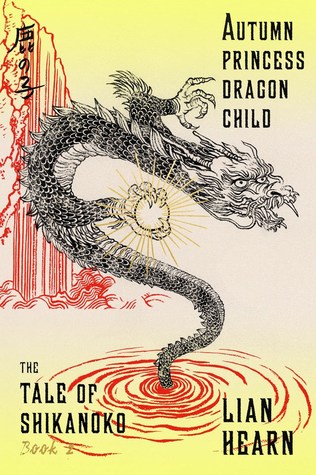 Autumn Princess, Dragon Child (Tale of the Shikanoko, #2) by
Autumn Princess, Dragon Child (Tale of the Shikanoko, #2) by 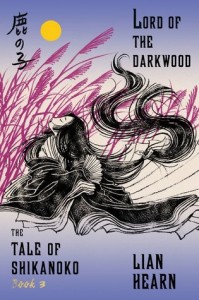 Escape Rating A-: Autumn Princess, Dragon Child does not stand alone. It is not just necessary, but absolutely crucial to read Emperor of the Eight Islands first, as Autumn Princess definitely starts in the middle of things. And those are things which are certainly not finished by its end. For that, we need to wait for
Escape Rating A-: Autumn Princess, Dragon Child does not stand alone. It is not just necessary, but absolutely crucial to read Emperor of the Eight Islands first, as Autumn Princess definitely starts in the middle of things. And those are things which are certainly not finished by its end. For that, we need to wait for 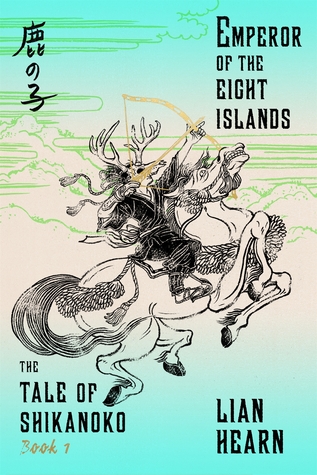 Emperor of the Eight Islands (Tale of Shikanoko, #1) by
Emperor of the Eight Islands (Tale of Shikanoko, #1) by